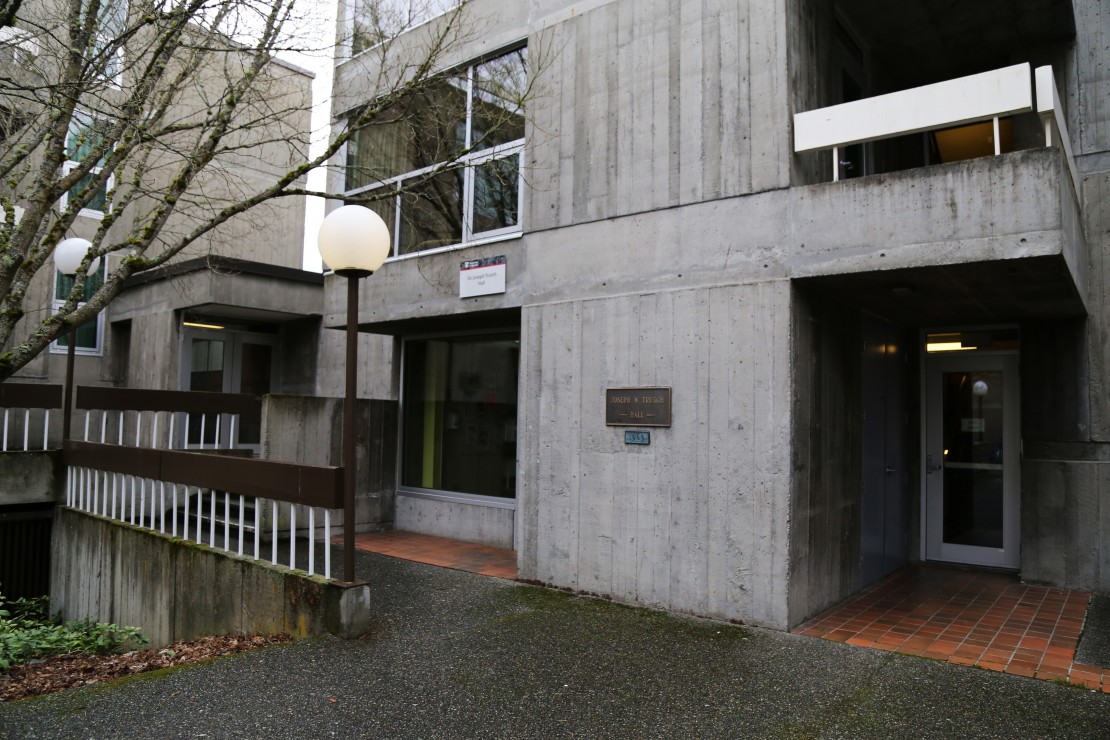
Students have started a petition to rename the Joseph Trutch Hall (pictured) because his policies contributed to a legacy of settler colonialism in British Columbia, and Canada at large. Photo by Belle White, Photo Editor
For the second time in seven years, UVic students are attempting to change the name of Joseph Trutch Hall. Lisa Schnitzler, a Trutch Hall resident, started a petition in December that has since garnered 107 signatures, as well as the endorsement of the UVSS Board of Directors, and sparked a formal name change appeal.
“I started doing my research and I found that it had been protested before,” said Schnitzler. “They tried to change the name in 2010. And I was like, ‘why not do it again?’”
Trutch Hall’s namesake was a British- born Canadian colonist, most noted for his time as B.C.’s Chief Commissioner of Lands and Works from 1864–1871, and then as B.C.’s first Lieutenant Governor (1871–1876) after the province joined confederation. But the name-change petition goes far beyond his position as a colonizer.
“I’d describe him as a scathing racist with a drive to dispossess, colonize, and capitalize on the Indigenous lands of Vancouver Island,” said Yvonne Houssin, a Métis student and member of UVic’s Native Students Union.
Trutch consistently described First Nations people as “savages,” and in a letter to his mother in 1850, he called them “The ugliest & laziest creatures I ever saw, & we shod, as soon think of being afraid of our dogs as of them. [sic]” Although this type of racism was not uncommon at the time, Trutch was in a uniquely powerful position to act on his bigotry.
“His history isn’t a secret. You can Google his name and find this information very easily,” said Houssin. “Having a building named after him is . . . showing the utmost disrespect to the Indigenous people who he did this to, specifically to the W̱SÁNEĆ and Lekwungen people whose unceded and unsurrendered land the university resides on.”
In a 2007 edition of The Beaver, Trutch was listed by a group of historians as one of ten people in “Canada’s Hall of Infamy.” Featured along with the likes of Adrien Arcand, the founder of Canada’s Nazi party, Inouye Kanao, a brutal sergeant who was given the death penalty for war crimes, and Edward Farrer, an advocate for Canada’s annexation to the United States, Trutch was included for, among other misdeeds, leaving B.C. with “a legacy of litigation and a political problem that is unresolved to the present day.”
Before Trutch’s appointment as commissioner, Sir James Douglas negotiated various treaties with Indigenous peoples, taking ownership of their land and allocating reserves in exchange for a pittance in material goods. Though still harshly unfair in principle, reserves in Douglas’s time were much larger than they are today. Each reserve guaranteed an allocation of at least 10 acres per family and the initial process allowed First Nations to have input on which areas of the land they would keep. Trutch altered these policies drastically, arguing that “Indians really have no right to the lands they claim, nor are they of any actual value or utility to them.”
From late 1865 onwards, Trutch instituted severe reductions of reserves, covering up his actions by misrepresenting facts to both his superiors and the First Nations involved.
Though the First Nations whose land Trutch reduced were clearly unhappy with the new arrangements, he communicated to the Governor, Frederick Seymour, that they were on board with the new policies. By the end of this process, one estimate claimed over 40000 acres of original reserve land had been cut away.
Along with land, Trutch also took money from First Nations. In 1869, he was handed a sum of $1984.82 (amounting to over $40 000 today) that was meant to finance the Songhees First Nation, but the reserve never received a penny.
And when British Columbia joined Canada in 1871, Trutch included a misleading and opaque clause in B.C.’s terms of union that allowed his policies to continue unabated. Ironically, “negotiat[ing] B.C.’s terms of union with the government of Canada” is listed as one of Trutch’s accolades on the University of Victoria’s website.
The first attempt to change the name of Trutch Hall occurred in 2010, but it fell flat at the advisory committee stage. Noah Ross, who helped spur the movement, explained to the Martlet via Facebook that, “there was one core objection from the committee at the time which was ‘if we change this one, won’t we have to change them all?’
“I tried to say no, Trutch is a specific asshole, but this didn’t get traction,” he said.
However, Ross explained that despite his unsuccessful attempt, name changes at UVic are possible under the right circumstances. “I did get to talk to some people who were involved in the campaign to rename the Begbie Building to the Fraser Building (which was successful),” said Ross. “They said that the fact that Fraser was a big university support/administrator and they had died recently gave the university an easy alternative.”
For Schnitzler, the name change process, which comprises several committees and falls under the authority of UVic’s president, has only just begun. But as she explained, navigating the impending bureaucratic maze is only half the battle.
“The whole point for me isn’t just to get the name changed, it’s to start a conversation about colonization and indigenizing our campus,” said Schnitzler.
Houssin expressed similar sentiments. “The tangible difference within that [university-First Nations] relationship will come from the precedent of the name change or what it is named to, rather than if it is changed,” she said.
“If it isn’t changed after this amount of attention, the university will have shown that they do not respect or value their relationship with Indigenous people, [and] rather [that] they value the continuation of upholding the legacy and views of Trutch.”






